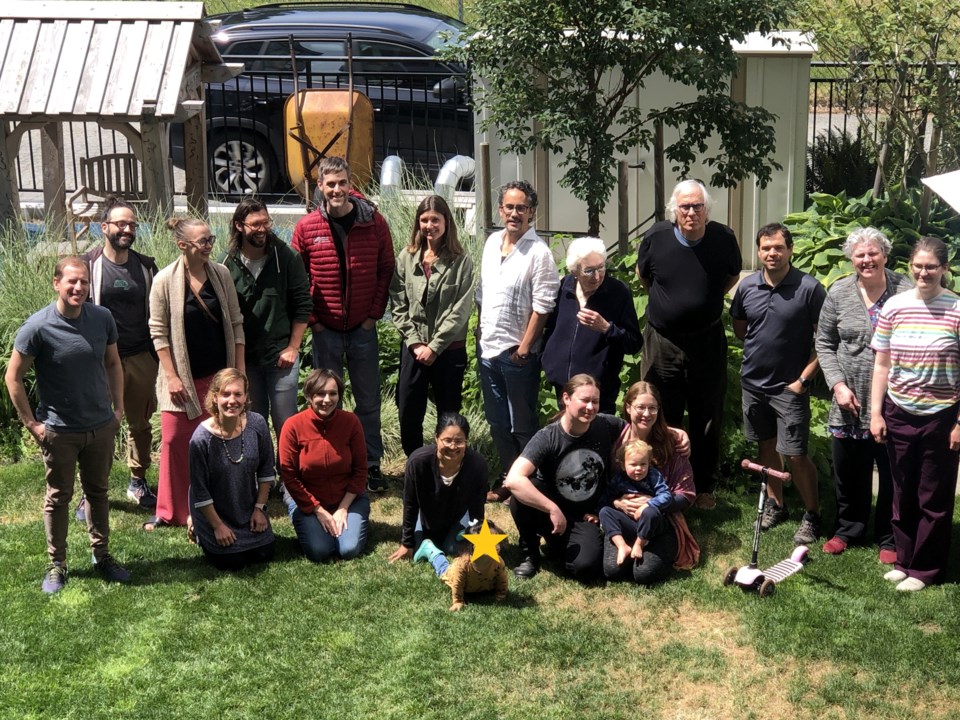When Catarina Moreno and her husband learned that the charming, if not slightly run-down, 1923 apartment building they had been happily renting in the West End was up for sale, they naturally began looking into other places to live.
The pair are both immigrants--she from Germany and he from Spain--who met and married in Vancouver. They want to make B.C. their home but Moreno says they feel the effects of the immigrant experience in Vancouver.
"You're citizens of the world, which unfortunately also means that basically there ain't that many people around you," Moreno tells V.I.A.
The couple have friends and professional networks but when it came to deciding where to live next, Moreno couldn't see herself living in a space as impersonal as a traditional condo building, which she says can be isolating.
Because community and chosen family are hard things to build and Vancouver is often accused of being a lonely place, Moreno and her partner landed on the idea of cohousing.
What is cohousing?
Cohousing is a concept popularized in Denmark in the late 1960s. In general, the developments consist of private homes built in intentional communities around shared spaces.
Unlike a co-op which includes tenant/owner vetting and offers affordable housing, co-housing projects are market price but they're more common than one might expect in Vancouver. There are four within the city limits alone and 10 in the Lower Mainland.
However, they're very difficult to get into unless you get in on the ground floor, so to speak.
"Sometimes apartments come up for sale, but once in a blue moon and then it's the Hunger Games," says Moreno.
She and her husband started to befriend members of Metro Vancouver cohousing projects and signed up for email lists about opportunities before being alerted to a new group of similarly community-minded people building a cohousing project of their own in East Vancouver.
A small consulting agency was beginning to recruit members for the project and the couple jumped on board.
The members oversee in committee the design and construction of the building and will eventually make up the strata so "you already get to know your neighbours really well in the process," says Moreno.
What will the project look like?
The lot that will eventually become this new housing project at 2732 Duke St was occupied by four single-family homes in the Norquay area where there is already redevelopment and "gentle densification" taking place, as per the Norquay plan.
Since May, Moreno says she's been attending design workshops and witnessing the "magic" that cohousing architects talk about which is the community deciding how they want to live.
American Charles Durrett is the architect behind the East Van Cohousing project and "the man" when it comes to cohousing developments, according to Moreno. He's written multiple books on the subject and completed the 31-unit 6,500 square-foot Vancouver co-housing project on 33rd Ave. back in 2015.
The designs for the East Van space are expected to be finalized by the end of August and then construction will begin.
The setup will include 30 or so private apartments with one to three bedrooms and their own kitchens, but, on every floor, there will also be shared community elements such as a workshop, playroom, laundry (the apartments will have the option for in-suite), media room, rooftop with garden beds and BBQs, guest suite, and a common house with shared kitchen and living/dining space.
There is a strong undercurrent of sustainability to the project as well, she expands. Cohousing can promote owning and consuming less because when 30 households share a space some people also share stuff such as cars, bikes, wagons, and toolkits.
Dealing with conflict
Not everyone is necessarily thrilled by the idea of designing their home by committee and Moreno acknowledges that cohousing is definitely "a choice" and not without conflict.
"It's community when you want it," she explains. "When I open the door, there are little cozy hallways with seating areas, there's the common house, but I can also close my door and then it's a regular apartment. It's like the best of both worlds."
Moreno also says that the desire to be with people and be a part of something has to be there. Even though cohousing doesn't vet people, most projects are pretty open about their values up front and people either respond to that or they don't.
As a professional facilitator, Moreno knows that there are ways to handle conflict and make decisions in a decentralized, self-managed setting most of which come from capitalizing on everyone's different skill sets.
"I'm fairly confident that we will manage but that doesn't mean that there won't be any conflict ever. But hey, what group is not moving through conflict? You just need to set it up skilfully," says Moreno.
The project isn't predicted to be fully complete until 2026 but Moreno says she's excited to move from the West End and learn more about another Vancouver neighbourhood that she isn't familiar with.
"Turns out that there's a lot happening in Norquay, in the sense of building community centres and revitalization, and then this [project]," she says.



